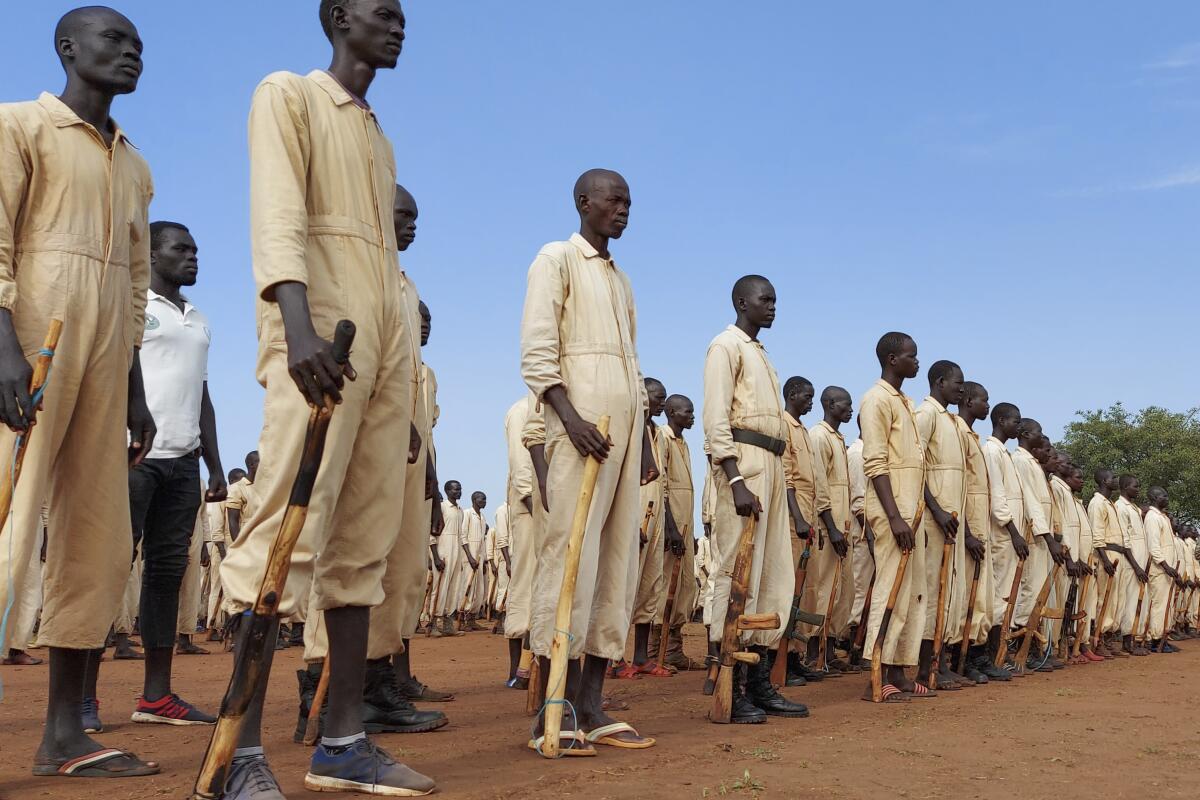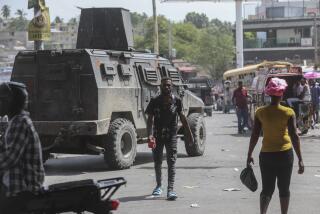U.N. extends its South Sudan peacekeeping force to prevent a return to civil war

- Share via
UNITED NATIONS — The U.N. Security Council voted unanimously Friday to extend the almost 20,000-member U.N. peacekeeping mission in South Sudan, with a mandate “to advance a three-year strategic vision to prevent a return to civil war” and build peace both nationally and locally.
The resolution approved by the council also authorizes the mission, known as UNMISS, to “support inclusive and accountable governance and free, fair and peaceful elections.”
It demands that all parties to the conflict and armed groups “immediately end the fighting throughout South Sudan.”
There were high hopes that South Sudan would have peace and stability after gaining its long-fought independence from Sudan in 2011. But the world’s youngest nation slid into ethnic violence in December 2013, when forces loyal to President Salva Kiir, an ethnic Dinka, started battling those loyal to Riek Machar, his former vice president who belongs to the Nuer people.
Numerous attempts at peace failed, including a deal that saw Machar return as vice president in 2016 — only to flee the country months later amid fresh fighting. Intense international pressure followed a 2018 peace deal, and on Feb. 22, 2020, a coalition government led by Kiir was formed, with Machar as his deputy. But peace still remains elusive.
The civil war has killed nearly 400,000 people and displaced millions, and the death toll keeps rising.
The Security Council resolution recognized that the reduction in violence between parties to the peace agreement “and that the permanent cease-fire was upheld in most parts of the country.”
But it also strongly condemned all fighting, including increased violence between armed groups in some parts of the country. And it condemned the mobilization of these armed groups by members of the government’s forces and by armed opposition groups.
The council demanded that South Sudan’s leaders fully implement the permanent cease-fire, including reconstituting the Transitional National Legislative Assembly and the Council States and initiating “a permanent constitution-making process, with broad-based public consultations.”
Council members expressed “grave concern” at ongoing reports of sexual and gender-based violence and demanded that all parties immediately halt all violence and human rights abuses, including rape and other violence against women, and hold those responsible accountable.
The resolution expressed alarm at “the dire humanitarian situation, the high levels of food insecurity in the country and likely famine in some areas” and at the 8.3 million South Sudanese in need of humanitarian assistance.
U.N. Secretary-General António Guterres said at a Security Council meeting Thursday on conflict-driven hunger that in South Sudan “chronic sporadic violence, extreme weather and the economic impact of COVID-19 have pushed more than 7 million people into acute food insecurity,” the highest level since the country declared independence from Sudan 10 years ago.
Food prices are so high, Guterres said, “that just one plate of rice and beans costs more than 180% of the average daily salary — the equivalent of about $400 here in New York.”
World Food Program Executive Director David Beasley told the council Thursday that he visited the country’s western Pibor county in early February and heard in recent days that “in extreme circumstances, mothers are resorting to feeding their children with the skin of dead animals — or even mud.”
“This is a desperate situation that calls for urgent attention,” he said. “The local population call 2021 ‘the year of starvation.’ And their suffering is the result of widespread conflict, and the unprecedented floods that came in 2019 and 2020. These people are in the crossfire of conflict while bearing the brunt of the climate crisis.”
Robert Mardini, the director-general of the International Committee of the Red Cross who visited South Sudan last week, said Wednesday that it is “a forgotten conflict” facing a “humanitarian crisis” made worse by the COVID-19 pandemic.
The resolution adopted Friday extended the mandate of UNMISS until March 15, 2022. It details the responsibilities of U.N. peacekeepers in protecting civilians, creating conditions to deliver humanitarian aid, supporting the peace process and implementation of the 2020 agreement, and in monitoring, investigating and reporting on human rights abuses and violations of international humanitarian law.
More to Read
Sign up for Essential California
The most important California stories and recommendations in your inbox every morning.
You may occasionally receive promotional content from the Los Angeles Times.










